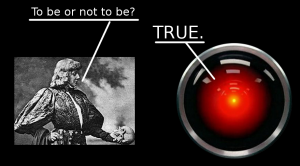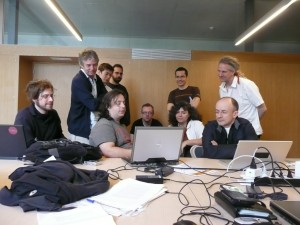All for a question mark
Hey, did you know that the "where" keyword in the "where" clause in SPARQL is optional? Yep, you can check it here!
What does this mean? Well, instead of writing something like
select ?s ?p ?o where{
?s ?p ?o
}
you can write
select ?s ?p ?o {
?s ?p ?o
}
So, what's the problem? Well, there is no problem... But what if you forget a space and write the following?
select ?s ?p ?owhere {
?s ?p ?o
}
I guess you can understand what this means :) Of course it is very easy to spot this error, but what if you are building the query string like the following one?
$query = "select ?s ?p ?o";
$query .= "where {\n";
$query .= " ?s ?p ?o\n";
$query .= "}";
I know, I know, that is a quick and dirty way of doing it, and anyone who does this should pay the fee. But what if a poor student forgets a \n in the concatenation, the system does not return any error, and all the objects you were asking for are not returned? Be aware, friends, and don't repeat his mistake... ;-)
[thanks Sarp for providing me the chance to spot this error - it was a funny reversing exercise!]
Posts about Vocamp Ibiza 2009
Just a couple of links to other participants' feedbacks on Ibiza VoCamp:
- A post by Peter Mika
- A post by Alexandre Monnin
And now that we speak about this, here's a pic of the actual owner of our room in Ibiza: from the very first day, he followed us to the room and settled there. But we had our revenge: we gave it a new name, and now everyone calls it RDF.
SquirrelRDF-IMAP is out!
At last, SquirrelRDF-IMAP code is available!
- check it out from the SVN repository into Eclipse:
svn co https://svn.sourceforge.net/svnroot/jena/SquirrelRDF/trunk
- add Jena libs to the project's build path (I tested Jena 2.5.6 and it works fine)
- the class to run is com.hp.hpl.squirrelrdf.imap.test.Scratch.java, a very very simple app which loads a ready made SPARQL query and sends a request to a gmail account I had set up for tests
- inside "examples" you can find the file imap_map.n3 which contains the configuration. From here you can set up access to your own email accounts or the way mapping is done between my dummy email ontology and IMAP requests. In the "queries" directory you can find some example queries.
The tool is still very rudimental but I think it already gives an idea about some of the potentialities of querying mailboxes with SPARQL, meshing up data from different sources etc. If you are interested in the details there's also a techreport about this work here.
A big... well, HUGE thanks to Damian Steer who allowed me to integrate the IMAP plugin code into the official SquirrelRDF trunk!
People from Ibiza
Got back from Vocamp Ibiza + Future of Web Search 2009 Workshop. Just one word: great!
I spent a great time there and came back enlightened and with a lot of enthusiasm. Hope that will last long enough to produce something interesting :-)
PhD, at last
I'm finally done! Today I had my final dissertation, maybe a little too short (we only had 20' for the presentation, plus 10' for the questions) but at the end I was satisfied... Slides are available here.
For those who wonder why there are more slides after the end: well, I was keeping them to help me answer some possible questions... And the trick worked ;-)
A Virtuous Cycle of Semantics and Participation
At last, I have submitted the final version of my PhD thesis!
Well, it will never be finished, as I guess I'll never be completely satisfied with it. But it had to end sooner or later, and while I completely agree with my reviewer when he says that I should have delved much deeper into some parts (Sebastian, again thanks a lot for your feedback!), I have to move on and I hope that what I leave here will become useful for someone else's work.
Here's the thesis. Any feedback (public or private) is welcome, of course: there's still so much to say - and I'd like to continue discussing about these topics with someone.
New collaborations
I'm not a PhD student anymore! Though, I'm not a PhD yet... :-)
Yes, this is how it works here: on Dec, 31st I have stopped being a PhD student, as my school officially ended that day. But I won't be a PhD until after my dissertation which will take place on April, 7th!
This is a very weird feeling, being basically... uhm... "nothing". Especially after I have been both a PhD student and an Intern last summer, splitting my time between two tasks: days working for HPL, nights working on my thesis. I still remember (and kinda miss) all those nights biking back home on El Camino, after a 14-hour session of work - tired and dizzy, I guess I risked my life sometimes :)
Btw, during this limbo, in which I still don't know exactly what I am, I managed to find a couple of project to contribute to:
- the Webatelier laboratory at USI (Università della Svizzera Italiana, Lugano) is working on a project called Web2rism, which aims at developing a web2.0 (buzzword! buzzword!) reputation analyzer for touristic destinations. My work is related to system design, data extraction (scrapeers!), knowledge management (did anyone say RDF store?) and... well, as many technical stuff as I can stand :)
- a nice, not huge but smart company called Noustat, located in Milan, is financing a project aimed at creating taxonomies (or, well, taxonomy skeletons that could be used as suggestions for ontology managers) out of unstructured text. The approach is inspired by Fionn Murtagh's work, which I did not know and while on one hand it sounds really weird on the other it makes me very curious... well, we'll see :)
So, that's it... Still nothing whose life spans longer than some months, but I believe a good start not to get bored after the end of my PhD school!
Using semantics and user participation to customize personalization
At last, my HPL report has been officially approved for external publication! However, for some strange reason it still does not appear in the 2008 report list... Mah!
Btw, if you ever heard me speakin' about my RDFMonkey creature this is the paper you have to read: you can access the page @HPL here, or download a copy directly from here. Enjoy! :)
Improving Search and Navigation by Combining Ontologies and Social Tags
Paper has been accepted! Just quoting Giorgio Orsi's post (who, in turn, is quoting the abstract):
"The Semantic Web has the ambitious goal of enabling complex autonomous applications to reason on a machine-processable version of the World Wide Web. This, however, would require a coordinated effort not easily achievable in practice. On the other hand, spontaneous communities, based on social tagging, recently achieved noticeable consensus and diffusion. The goal of the TagOnto system is to bridge between these two realities by automatically mapping (social) tags to more structured domain ontologies, thus, providing assistive, navigational features typical of the Semantic Web. These novel searching and navigational capabilities are complementary to more traditional search engine functionalities. The system, and its intuitive AJAX interface, are released and demonstrated on-line."
Paper is available here.


